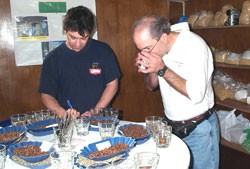
With a glut of low quality coffee saturating the world market, coffee prices have plummeted, but the specialty and organic markets, which often pay more than double the price of conventional coffee, offer Nicaragua’s small farmers one way to increase their incomes.
“The crisis is not only over-supply of coffee,” said Byron Corrales, a coffee grower and vice-president of Cafenica, a 6,000-member federation of small growers’ cooperatives. “It’s also about protecting our environment and establishing a relationship between producers, buyers and consumers that will benefit everyone.”
Taking a big step in that direction, USAID signed an agreement with Cafenica, Thanksgiving Coffee and the Inter-American Institute for Agricultural Cooperation to give farms lasting market linkages with specialty coffee buyers willing to pay fair prices for high-quality, sustainably produced coffee. In addition, USAID has trained producers in better farming and processing methods that will help them meet higher international standards. It has also trained 65 cuppers - specialists in evaluating the taste and aroma of coffee - and helped build a roasting company and 21 cupping labs countrywide to ensure a quality product.
Less than a week after the agreement was signed, specialty coffee buyers toured Cafenica’s cupping labs and met with farmers. Scott Merle, a coffee buyer at Baddorf and Bronson Coffee Roasters in Olympia, Washington, was making his first trip to Nicaragua to get a better understanding of how the cooperatives work. “Nicaraguan coffee is a good, solid cup of coffee,” said Merle. “If they can keep the quality consistent, I’ll definitely be buying more.”
Paul Katzeff, head of Thanksgiving Coffee, is optimistic about the industry’s recent strides. “The entire coffee industry in the world is looking at Nicaragua and these cupping labs,” he said. “The Nicaraguans have presented a model of hope because quality and price are related, and the only way you can get quality is if the farmers understand what the target market wants and the target profile and taste that you are aiming for.”







Comment
Make a general inquiry or suggest an improvement.